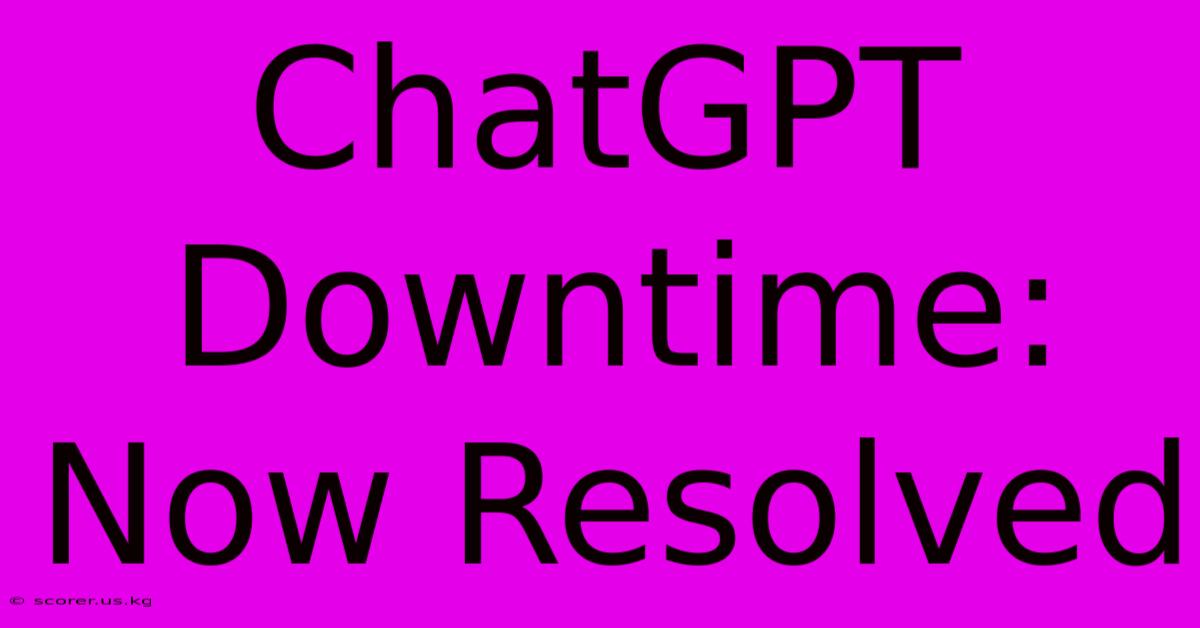ChatGPT Downtime: Now Resolved

Discover more detailed and exciting information on our website. Click the link below to start your adventure: Visit Best Website scorer.us.kg. Don't miss out!
Table of Contents
ChatGPT Downtime: Now Resolved
ChatGPT, the wildly popular AI chatbot, experienced a period of downtime earlier today, leaving many users frustrated and unable to access the service. The outage, which began at approximately [Insert Time of Outage Here], impacted users worldwide and sparked widespread discussion across social media platforms. However, the issue has now been resolved, and ChatGPT is back online and functioning normally.
What Happened During the ChatGPT Outage?
While OpenAI, the company behind ChatGPT, hasn't released an official statement detailing the precise cause of the downtime, several theories have circulated online. These range from server overload due to exceptionally high user demand to potential technical glitches within the system's infrastructure. The lack of immediate communication from OpenAI only fueled speculation and increased user anxiety.
Impact of the Downtime
The disruption caused significant inconvenience for many. Users relying on ChatGPT for various tasks, from creative writing and coding assistance to research and customer service, were left scrambling to find alternative solutions. The sudden unavailability highlighted the increasing reliance on AI tools and the potential impact of unexpected outages on productivity and workflow. Many educational institutions and businesses utilize ChatGPT for various tasks, so the downtime had a broad reach.
Social media platforms became inundated with posts from frustrated users, sharing their experiences and speculating about the cause of the problem. The outage served as a reminder of the inherent vulnerabilities of even the most sophisticated online services.
ChatGPT's Back! What to Expect Moving Forward
Now that ChatGPT is back online, users can resume their interactions without interruption. However, the incident raises important questions about service reliability and the need for robust infrastructure to handle fluctuating user demand.
Lessons Learned from the Outage
This downtime emphasizes the crucial need for:
- Improved infrastructure: OpenAI might need to invest in more robust server capacity to prevent future outages, especially during periods of high traffic.
- Transparent communication: OpenAI should consider implementing a more proactive and transparent communication strategy during service disruptions to keep users informed. Regular updates would significantly reduce anxiety and speculation.
- Disaster recovery planning: A comprehensive disaster recovery plan is essential to minimize the impact of future outages and ensure a swift restoration of service.
The Future of AI Chatbots and Reliability
The ChatGPT outage underscores the ongoing challenges of providing reliable and accessible AI services. As AI chatbots become increasingly integrated into our daily lives, ensuring consistent uptime and robust infrastructure becomes paramount. The incident serves as a valuable lesson for both OpenAI and other AI developers, highlighting the importance of investing in scalable and resilient systems. Users, too, should anticipate occasional disruptions and consider alternative solutions in the event of future outages.
This incident, while inconvenient, ultimately highlights the growing importance and influence of AI technology. While the downtime was frustrating, OpenAI's swift resolution demonstrates their commitment to providing a high-quality service. We can expect continued improvements and a stronger, more resilient platform moving forward.

Thank you for visiting our website wich cover about ChatGPT Downtime: Now Resolved. We hope the information provided has been useful to you. Feel free to contact us if you have any questions or need further assistance. See you next time and dont miss to bookmark.
Featured Posts
-
Wordle 1287 Fridays Word Solution
Dec 27, 2024
-
Boxing Day Brings Moderate Sales
Dec 27, 2024
-
Warriors Triumph At Showcase
Dec 27, 2024
-
Liverpool Wins 3 1 Against Leicester City
Dec 27, 2024
-
Kansas State Vs Rutgers Live Game Score
Dec 27, 2024
